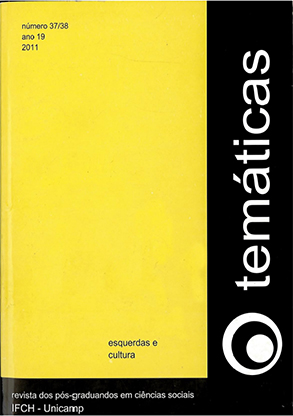Abstract
The Comando dos Trabalhadores Intelectuais (CTI) was a group, a space of organization and representation of brazilian intellectuals and artists and that, previous to the military coup in 1964, participated of the debates and fomented the inclusion of sectors of the national intelligentzia in the democratization’s process of the culture. His insertion politics, of the point of view of the effervecence lived for the organized socials movements in Brazil in the years of João Goulart’s government, bring elements to detail the dynamics of the cultural left’s organizations that had emerged of the review’s process of Brazilian Communist Party (PCB), since 1958. The relevance of CTI is confirmed when understand it like an organization that congregated many intellectuals and artists that, after of the military coup in 1964, had been presents in the artistic and cultural brazilian scene, doing resistance to the military governments that if had occurred in the next decades.
References
BERLINCK, Manoel Tosta. O Centro Popular de Cultura da UNE. Campinas: Papirus, 1984.
CARONE, Edgard. O PCB: 1943-1964 vol. 02. São Paulo: Difel, 1982.
CHAUÍ, Marilena. Seminários. São Paulo: Brasiliense, 1983.
CHILCOTE, Ronald. O Partido Comunista Brasileiro: conflito e integração (1922-1972). Rio de Janeiro: Graal, 1982.
CORBISIER, Roland. “Situação e alternativas da cultura brasileira”. In: Introdução aos problemas do Brasil. Rio de Janeiro: ISEB, 1956.
FELIX, Moacyr. Entrevista concedida a Marcelo Ridenti. Rio de Janeiro, 24 de janeiro de 1996.
FREDERICO, Celso. “A política cultural dos comunistas”. In: MORAES, João Quartim de (org.) História do marxismo no Brasil, III. Campinas: EdUnicamp, 1998.
GARCIA, Miliandre. Do teatro militante à música engajada: a experiência do CPC da UNE. São Paulo: Perseu Abramo, 2007.
GRAMSCI, Antonio. Literatura e vida nacional. Rio de Janeiro: Civilização Brasileira, 1978.
HABERMAS, Jürgen. Mudança estrutural da esfera pública. Rio de Janeiro: Tempo Brasileiro, 1984.
MATTOS, Marcelo Badaró. “O governo João Goulart: novos rumos da produção historiográfica”. Revista Brasileira de História, vol. 28, nº 55.
ORTIZ, Renato. Cultura brasileira e identidade nacional. São Paulo: Brasiliense, 1986.
PÉCAUT, Daniel. Os intelectuais e a política no Brasil: entre o povo e a nação. São Paulo: Ática, 1990.
SANTOS, Raimundo. A primeira renovação pecebista: reflexos do XX Congresso do PCUS no PCB. Belo Horizonte: Oficina de Livros, 1988.
SEGATTO, José Antônio. Reforma e revolução: as vicissitudes políticas do PCB (1954-1964). Rio de Janeiro: Civilização Brasileira, 1995.
SODRÉ, Nelson Werneck. A fúria de Calibã: memórias do golpe de 64. Rio de Janeiro: Bertrand Brasil, 1994.
TOLEDO, Caio Navarro de. O governo Goulart e o golpe de 64. 7. ed. São Paulo: Brasiliense, 1997.
VIEIRA, Luiz Renato. Consagrados e malditos: os intelectuais e a editora Civilização Brasileira. Brasília, 1996. Tese (Doutorado em Sociologia) – Instituto de Ciências Humanas. Universidade de Brasília. (2º vol.).
WILLIAMS, Raymond. Cultura. Rio de Janeiro: Paz e Terra, 2000.

This work is licensed under a Creative Commons Attribution-NonCommercial-ShareAlike 4.0 International License.
Copyright (c) 2011 Rodrigo Czajka

